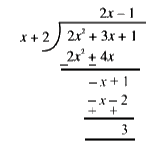A diatomic molecule is made of two masses m1andm2 which are separated by a distance r . If we calculate its rotational energy by applying Bohr's rule of angular momentum quantization it energy will be ( n is an integer )
A
(m1+m2)2n2h22m21m22r2
B
n2h22(m1+m2)r2
C
2n2h2(m1+m2)r2
D
(m1+m2)n2h22m1m2r2
Video Solution
Text Solution
The correct Answer is:D
Energy of the system of two atom of diatomic molecules
E=12Iω2
I =Moment of inertia = (m1r21+m2r22)
and ω=LI,L→ angular momentum
∴E=12(m1r21+m2r22)ω2
=12(m1r21+m2r22)L2(m1r21+m2r22)2
=12L2(m1r21+m2r22)=n2h28π2(m1r21+m2r22)
m1r1=m2r2
r1+r2=r

∴ r1=m2rm1+m2,r2=m1rm1+m2
∴ E=n2h28π2.1m1.m22r2(m1+m2)2+m2.m21r2(m1+m2)2
=n2h28π2(m1+m2)m1m2r2
As h=h(2π)∴ E=n2h2(m1+m2)2m1m2r2

|
Similar Questions
Knowledge Check
A diatomic molecule is madde of two masses m1andm2 which are separated by a distance r . If we calculate its rotational energy by appliying Bohr's rule of angular momemtum quantization it energy will be ( n is an integer )
A(m1+m2)2n2h22m21m22r2Bn2h22(m1+m2)r2C2n2h2m1+m2r2)D(m1+m2)n2h22m1m2r2Two bodies of masses m1 and m2 are separated by a distance R. The distance of the centre of mass of the bodies from the mass m1 is
Am2Rm1+m2Bm1Rm1+m2Cm1m2m1+m2RDm1+m2m1RTwo bodies of masses m1 and m2 are separated by a distance R. The distance of the centre of mass of the bodies from the mass m1 is
Am2Rm1+m2Bm1Rm1+m2Cm1m2m1+m2RDm1+m2m1R
In a double star system, two stars of masses m1 and m2 separated by a distance x rotate about their centre of mass. Find the common angular velocity and Time period of revolution.
View SolutionTwo bodies of masses m1 and m2 have the same linear momentum. What is the ratio of their kinetic energies?
View SolutionFor a Bohr atom angular momentum M of the electron is : (n=0,1,2,….)
View SolutionFor a Bohr atom angular momentum M of the electron is : (n=0,1,2,….)
View SolutionA molecule consists of two atoms each of mass m and separated by a distance d. If K is the average rotational K.E. of the molecule at particular temperature, then its angular frequency is
View Solution
